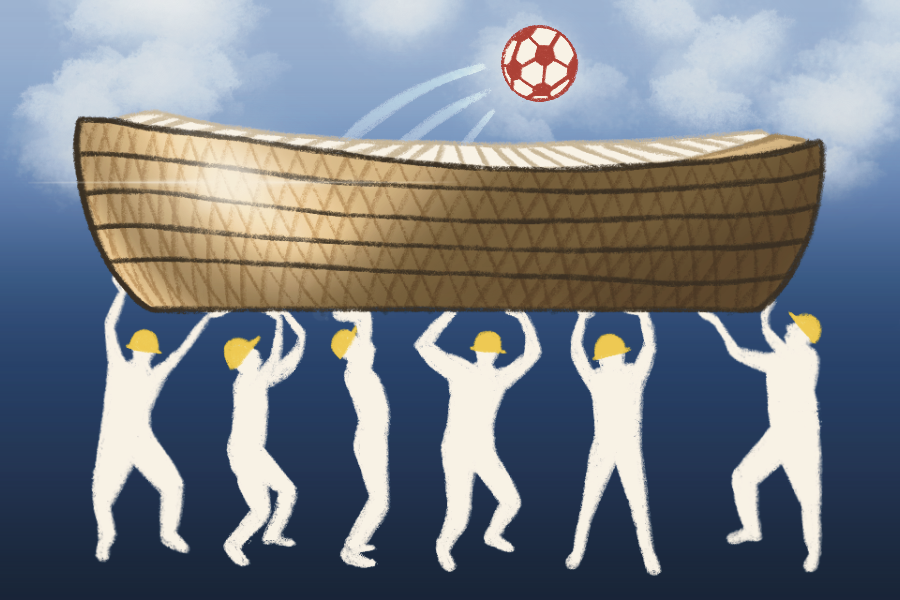It’s time to stop ignoring corruption and abuse: boycott the 2022 World Cup
The only way to combat these offenses is for Whitman students and the soccer fans across the world that hold this sport together to unite and boycott the 2022 World Cup.
November 20, 2022
The world is holding its breath. A colorful ball flies through the air in what seems to be slow-motion before slotting perfectly in the top-right corner of the goal. Moments later, lights flash, celebratory music blares and the crowd roars as the soccer player slides across the field after scoring the winning goal. Once the final whistle blows, the bench storms the field and the winning team leads the crowd in a euphoric chant. No sporting event matches the intensity of the World Cup, soccer’s biggest stage and one of the most popular sports events worldwide. However, amidst the excitement surrounding the Cup’s opening ceremony today, the tragic reality remains that Qatar, this year’s World Cup host, should have lost its right to host years ago.
Behind the colorful facade of new, modern buildings and flashy stadiums, the 2022 Cup hides countless controversies. The Middle-Eastern country has always had a poor human rights record, but Qatar’s preparation for the Cup has revealed troubling details of migrant worker abuses, excessive construction costs and the environmental damage that made the tournament possible. The only way to combat these offenses is for Whitman students and the soccer fans across the world that hold this sport together to unite and boycott the 2022 World Cup.
Qatar “earned” the right to host the Cup after the contentious 2010 bidding process. Proponents of the decision claimed that selecting a Middle-Eastern country to host the tournament would allow the sport to reach new fans — an admirable effort. However, this effort isn’t enough to overcome the growing body of evidence in support of the allegation that FIFA officials accepted bribes from Qatar to support the country’s hosting bid. When Qatar received hosting rights, it exposed corruption within the Association that invalidates the bidding process and tarnishes the Cup’s reputation. Without consequences for the offender, FIFA’s bribery opens a door for other countries or entities to attempt similar acts.
During the 12 years since Qatar received the rights to host, the country has addressed concerns over its infrastructure by constructing seven new stadiums and additional housing for visitors. This project cost upwards of $220 billion— more than 60 times the amount spent at the 2010 World Cup in South Africa.
Qatar’s excessive spending will have several dangerous ramifications for the environment. Despite Qatar’s commitment to hosting a carbon-neutral event, a FIFA report found that the Cup will have a footprint 3.6 million metric tons of CO2 — enough energy to power 460,000 homes for a year. Qatar’s small size theoretically makes it an ideal location for a carbon-neutral tournament due to fewer domestic flights and the close proximity of the air-conditioned outdoor stadiums to each other. However, the country — which is roughly the size of Connecticut and has a population of 2.9 million — lacks the space to accommodate an expected 1.2 million visitors, some of whom will stay in neighboring countries and shuttle into Qatar for the Cup. Fans should not condone this unnecessary waste of energy and materials on a 28-day championship.
Although 84% of the country’s population is migrant workers, Qatar has hired an additional 30,000 foreign laborers to construct World Cup stadiums and related infrastructure. The country has a long history of abusing these workers: according to Amnesty International, migrant laborers routinely suffer from poor living conditions, delayed or withheld salaries, threats and forced labor. The country’s “kafala” system prohibits foreign workers from transferring jobs, leaving Qatar or exiting the workforce without their employers’ permission. The system forces workers to choose between suffering abuses like passport confiscation and movement restriction, or the prospects of imprisonment. Since Qatar earned hosting rights, more than 6,500 migrant workers have died within its borders.
For junior Isabel Garcia-Musalem, the World Cup is a time to unite with family and friends. However, these worker abuse allegations strip the Cup of its meaning, she said.
“A sport is meant to bring together a community,” Garcia-Musalem said. “It’s not supposed to be built on the suffering of others.”
In addition to abusing foreign workers, Qatari authorities routinely persecute the LGBTQ+ community, with documented instances of beating and detainment — behavior that has drawn attention from world leaders as the country invites fans from across the globe. Soccer has the capacity to bring an incredibly diverse group of people together, and fans should not tolerate the marginalization that threatens the quality that makes the sport special.
The national soccer teams of Norway, the Netherlands and Germany have taken steps to protest Qatar’s human rights abuses by wearing shirts advocating for protections, while the Danish team left family members behind in an act of protest. However, t-shirts and armbands aren’t enough. It’s time for change, and those best suited to force substantial reforms are the people that make the Cup possible: the fans.
Soccer fans must hold both FIFA and Qatar accountable by sending the message that these atrocities are unacceptable. Expanding soccer to new countries is important, but not at the expense of human lives, the environment and the integrity of organized sports as a whole.
The only way to create change is by taking away the support that is required to make the event possible, and an empty stadium would send a powerful message. Fans should even consider tuning out of the World Cup on television to deny FIFA and Qatar the profits of their exploitative projects. If we want to move forward, fans need to show that we understand the suffering and corruption that the host country participated in. We must send FIFA and Qatar a clear and important message: the world will not tolerate the flagrant abuse and corruption that infiltrates our sports.











Walt Whitman • Dec 7, 2022 at 3:50 pm
First it was the article venerating Queen Elizabeth and now this piece which is pure performative outrage. The White Colonial overtones of the Black and White have never been more apparent. This is the mouthpiece of the school’s student body and Exhibit A on why it’s hard for students of color like me to attend Whitman in the year 2022.
Is this really about human rights or is it that the Black and White cannot stomach the idea that an Arab or Muslim country can host the World Cup?
It is fair to criticize Qatar on its poor track record of migrant workers but what about the United States track record of abuse of thousands upon thousands of migrants and even their children? I wonder if the writer, grandstanding about human rights issues in Qatar, would call to boycott the next World Cup that will take place in the US in 2026? I am old enough to remember when migrant children coming to America were caged and separated from their parents. Many never to be seen again.